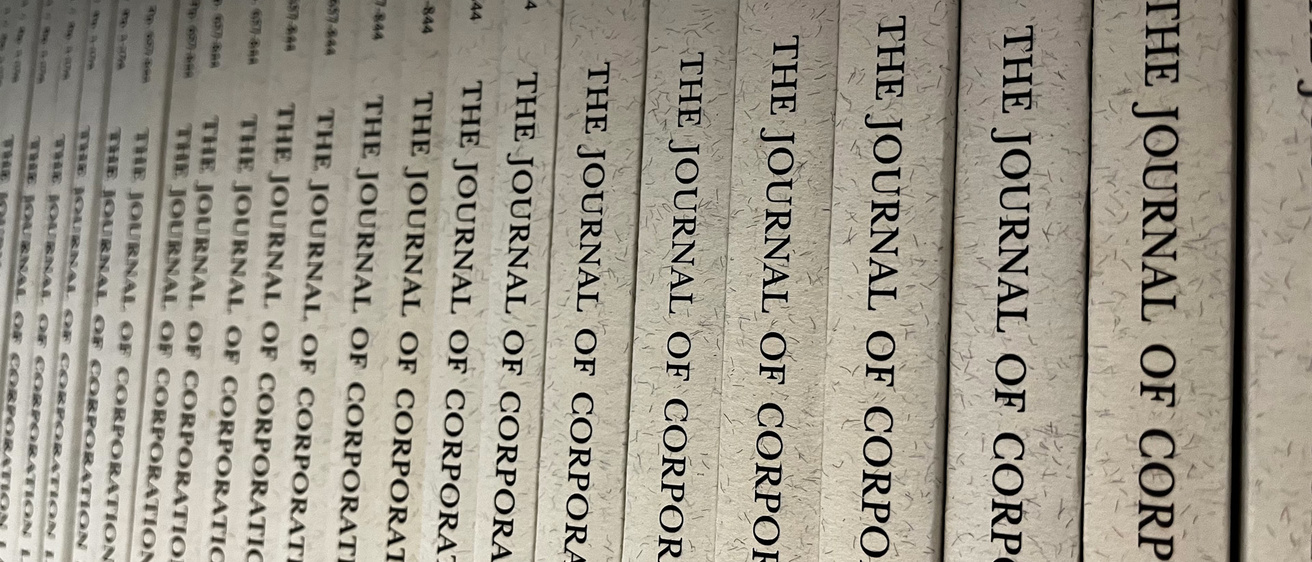In this issue:
Countering Capture: A Political Theory of Corporate Criminal Liability
In order to effectively deter organizational misconduct, countries must hold companies liable for their organizational misconduct. Some scholars argue, however, that countries should not impose criminal liability on companies and instead should rely entirely on civil liability, which can impose the same sanctions on companies as criminal liability. This claim that corporate civil enforcement is as effective as criminal enforcement is incorrect because it overlooks how the choice between the two affects companies’ ability to use their political influence to undermine corporate enforcement intensity. This Article shows that eliminating federal corporate criminal liability would undermine deterrence because large corporations would be better able to leverage their political influence over Congress and the White House to reduce corporate enforcement if companies are not criminally liable for two reasons. First, civil enforcement is more vulnerable to political influence channeled through Congress and the White House than criminal enforcement. Second, eliminating corporate criminal enforcement would leave civil enforcement more vulnerable to companies’ political influence, less effective at deterring corporate misconduct, and less likely to pursue individual wrongdoers.
Maximal Accountability with Minimally Sufficient Punishment
A criminal injustice system cannot rediscover its promise for justice without invigorating corporate criminal responsibility. However, maximizing corporate punishment is not a path to justice because policymakers must make choices about how much to invest in increased detection of corporate crime, warnings, persuading voluntary commitment to repair harm to victims, deferred prosecution agreements, in addition to increased prosecutions. Funding can shift from carceral punishment of crimes of the powerless to support all these forms of intervention. Ultimately, such transformation might be self-funded by improved tax compliance and reduced corporate sabotage of economic futures by the destruction of ecosystems. When all this is done as a coherent mix, corporate criminal responsibility can contribute profoundly to a good society.
A Restatement of Corporate Criminal Liability’s Theory and Research Agenda
This Article, for a collection in which authors were asked to “imagine a world without corporate criminal liability,” specifies the material questions that should be addressed if debate about the doctrine is to progress past longstanding and oft-repeated assertions. The strongest case for corporate criminal liability is based on the potential for its unique reputational effects to contribute to the prevention and deterrence of crime within corporations. Further research should take up a variety of unanswered questions about those effects having to do with mechanisms and audiences. The relevant inquiries are both theoretical and empirical. Answers will lie in further understanding of organizational and individual behavior more than in familiar models of the firm and deterrence that have largely shaped the literature to date.
Crime and the Corporation: Making the Punishment Fit the Corporation
The debate over corporate criminal liability has long involved a fight between proponents who argue that corporate liability is necessary for effective deterrence and opponents who claim that it “punishes the innocent.” This Article agrees and disagrees with both sides. Corporate criminal liability could play a critical role in establishing an effective deterrent to organizational misconduct, but today it largely fails. Currently, we have a system that combines Deferred Prosecution Agreements, Non-Prosecution Agreements, and extraordinarily generous sentencing credits for compliance plans that have failed, and the result is a system that is more carrots than sticks. The evidence seems clear that corporate fines seldom affect the company’s stock price (even when they are record penalties), that companies rarely self-report their misconduct (despite legal incentives to do so), and that courts impose penalties that can be easily absorbed as a cost of doing business.
But We Haven’t Got Corporate Criminal Law!
Criminal justice has four distinctive features. It 1) utilizes uniquely demanding procedure to 2) target the worst offenders with 3) the harshest penalties in a manner that 4) expresses society’s deepest moral condemnation. The United States’ purported system of corporate criminal justice lacks all four features. The biggest corporate criminals routinely sidestep all criminal procedure and any possibility of conviction by cutting deals with prosecutors, trading paltry fines and empty promises of reform for government press releases praising their cooperation. The real question is not whether the United States should retain corporate criminal law, but what it would take for the United States to have a corporate criminal justice system in the first place.
Corporate Criminal Liability: End It, Don’t Mend It
In this Article, I make the case in favor of abolishing corporate criminal liability. Criminal liability for corporations is peculiar, given that “entity liability” does not otherwise exist in criminal law. The legal system appropriately deals with law-breaking within other entities (such as police departments and labor unions) solely through criminal prosecutions of the individual offenders and civil suits against the entities within which criminality occurred. Corporate criminal liability is another example of overcriminalization, in which criminal law is unjustifiably used to address problems better dealt with through other means. Finally, corporate criminal liability is fundamentally incompatible with established legal principles governing criminal liability. Rather than squander limited resources on efforts to prosecute corporations and other business entities, we should invest in more robust civil regulation of businesses and increased prosecution of corporate officers and employees who abuse their positions by committing crimes.
